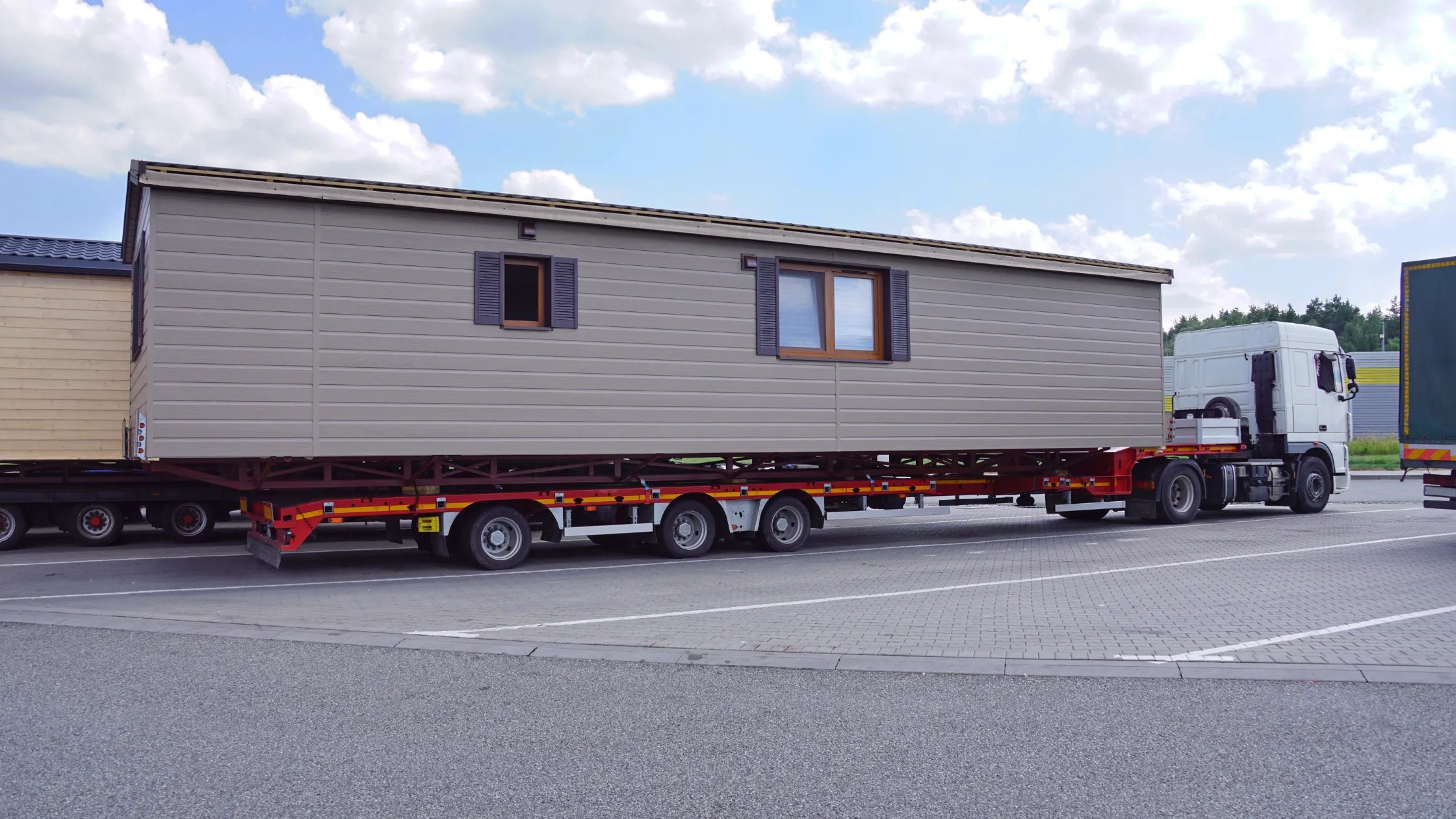Long Distance Mobile Home Moving: Complete Guide to Costs, Tips, and Professional Services

Moving a mobile home is a significant undertaking that requires careful planning and professional expertise. Understanding the process is crucial for a successful move, as thousands of manufactured homes relocate across the United States annually.
Whether you're relocating your single-wide mobile home across state lines or moving a double-wide home to a new mobile home park, this comprehensive guide covers everything you need to know about mobile home transportation.
Key Takeaways
- Understand the total cost factors involved in moving a mobile home
- Learn how to choose professional mobile home movers
- Discover necessary permits and legal requirements for mobile home relocation
- Get essential tips for preparing your manufactured home for transport
-
Find strategies to reduce moving costs and ensure a smooth relocation
"While the manufactured housing industry focuses heavily on transport logistics, the real competitive advantage lies in understanding that mobile home relocation is fundamentally a lifestyle transition service—families aren't just moving structures, they're relocating their entire community foundation, which requires a fundamentally different approach to customer care than traditional residential moves."
–Zach Richards, CEO, Caddy Moving
Understanding Mobile Home Types and Moving Requirements
The type of mobile home you're moving significantly affects both the complexity and cost of your relocation. Professional mobile home movers handle various manufactured home types, each with specific transport requirements.
Single-Wide Mobile Homes
Single-wide homes are typically up to 18 feet wide and represent the most cost-effective option to move. These manufactured homes require less specialized equipment and can often be transported in one piece, making them less expensive to relocate.
Double-Wide Mobile Homes
Double-wide homes measure up to 36 feet wide and require more complex moving procedures. Professional movers must separate these homes into sections for transport, then reassemble them at the new location. This increases both the cost to move your mobile home and the time required for relocation.
Triple-Wide and Larger Manufactured Homes
Triple-wide homes and larger manufactured homes present the most challenging moving scenarios. These require specialized equipment, multiple transport vehicles, and often police escort services during transport.
|
Mobile Home Type |
Maximum Width |
Moving Complexity |
Typical Cost Range |
|
Single-wide |
18 feet |
Low to Moderate |
$2,000 - $5,000 |
|
Double-wide |
36 feet |
Moderate to High |
$4,000 - $8,000+ |
|
Triple-wide |
54+ feet |
High |
$8,000 - $15,000+ |
Essential Pre-Move Preparations for Your Mobile Home
Proper preparation is critical when you're planning to move your mobile home. These steps ensure your manufactured home arrives safely at its new location.
Structural Preparations
- Secure or remove all loose outdoor items and attachments
- Disconnect utility services, including electricity, water, gas, and sewer
- Remove skirting and any permanent additions
- Inspect your mobile home's structural integrity
- Document any existing damage with photographs
Interior Preparations
- Remove or secure all personal belongings
- Drain water systems and appliances
- Disconnect and prepare appliances for transport
- Remove window treatments and fragile items
Legal Requirements and Moving Permits
Mobile home relocation involves complex legal requirements that vary by state and local regulations. Professional mobile home moving companies typically handle permit applications, but understanding the requirements helps ensure compliance.
Required Permits and Documentation
- Transport permits from state transportation departments
- Oversized load permits for wide homes
- Route permits for specific travel paths
- Local moving permits at destination
- Utility disconnect/reconnect permits
The distance of the move and route complexity affect permit requirements and associated fees. Professional movers familiar with local regulations can navigate these requirements efficiently.
Choosing Professional Mobile Home Movers vs. DIY Options
Why Professional Mobile Home Moving Companies Are Recommended
Professional mobile home movers offer several advantages over attempting a DIY move:
Expertise and Equipment: Professional moving companies have specialized equipment designed for manufactured home transport, including hydraulic jacks, steel beams, and transport trailers.
Insurance Coverage: Reputable mobile home moving companies carry comprehensive insurance protecting your home during transport.
Permit Knowledge: Experienced movers understand permit requirements and can handle applications across multiple jurisdictions.
Full-Service Options: Many professional mobile home movers offer complete relocation services, from disconnection at the original location to setup at the destination.
Evaluating Mobile Home Moving Companies
Consider the following factors when selecting professional mobile home movers:
Experience with Your Home Type: Ensure the company has experience moving your specific type of manufactured home.
Licensing and Insurance: Verify proper licensing and adequate insurance coverage for mobile home transportation.
Online Reviews and References: Research customer experiences and ask for references from recent mobile home relocations.
Service Scope: Determine whether you need transport-only services or full-service moving including setup at the new location.
Transparent Pricing: Reputable companies provide detailed estimates breaking down all costs involved in moving your mobile home.
Mobile Home Moving Costs: Understanding Price Factors
The cost to move a mobile home varies significantly based on multiple factors. Understanding these variables helps you budget appropriately and find the best deal for your relocation needs.
Primary Cost Factors
Distance of the Move: Long-distance moves cost more due to increased fuel, labor, and permit requirements. The average cost increases substantially for moves over 100 miles.
Mobile Home Size and Type: Larger manufactured homes require more equipment and labor, increasing the overall cost. Moving a double-wide home costs significantly more than relocating a single-wide mobile home.
Route Complexity: Difficult routes with narrow roads, bridges, or utility obstacles increase transportation costs.
Additional Services: Full-service movers charge more but handle everything from disconnection to setup at your new location.
Permit and Escort Requirements: Some moves require police escort services or special permits, adding to the total cost.
Seasonal Factors: Peak moving seasons may result in higher rates from mobile home moving companies.
Average Mobile Home Moving Costs
Single-Wide Mobile Home Moving Costs:
- Local moves (under 50 miles): $2,000 - $4,000
- Long-distance moves: $3,000 - $6,000
- Cross-country relocations: $5,000 - $10,000+
Double-Wide Mobile Home Moving Costs:
- Local moves: $4,000 - $6,000
- Long-distance moves: $6,000 - $10,000
- Cross-country relocations: $10,000 - $20,000+
These estimates include basic transport services. Full-service moves, including disconnection, transport, and setup, typically cost 25–50% more.
Creating Your Mobile Home Moving Timeline
Successful mobile home relocation requires planning. Start your moving process at least 8-12 weeks before your desired move date.
8-12 Weeks Before Moving
- Research and contact professional mobile home movers
- Obtain moving estimates from multiple companies
- Begin permit research and applications
- Notify your current mobile home park of your moving plans
6-8 Weeks Before Moving
- Finalize your moving company selection
- Complete permit applications
- Schedule utility disconnections at the current location
- Arrange utility connections at the new location
4-6 Weeks Before Moving
- Confirm moving date and logistics with your chosen company
- Complete mobile home preparations
- Arrange temporary accommodations if needed
- Purchase mobile home insurance for the move
2-4 Weeks Before Moving
- Complete final preparations and packing
- Confirm all permits are approved
- Prepare payment for moving services
- Conduct final walk-through with movers
Moving Week
- Complete final disconnections
- Ensure clear access for moving equipment
- Be present for pickup and delivery
- Inspect your mobile home upon arrival
Ways to Reduce Mobile Home Moving Costs
Get Multiple Quotes
Contact several professional mobile home moving companies to compare prices and services. The best mobile home movers provide detailed, transparent pricing.
Choose Off-Peak Times
Moving during off-peak seasons can result in lower rates from mobile home moving companies.
Consider Transport-Only Services
Should you be able to manage the disconnection and setup on your own, opting for transport-only moves can be considerably more cost-effective than full-service relocations.
Optimize Your Route
Work with movers to identify the most efficient, cost-effective route for your mobile home transport.
Handle Simple Tasks Yourself
Completing tasks like packing personal items and basic preparations can reduce labor costs.
Mobile Home Insurance During Your Move
Protecting your investment during relocation is crucial. Standard homeowner's insurance may not cover mobile home transportation risks.
Types of Coverage to Consider
- Transit Coverage: Protects against damage during transport
- Liability Insurance: Covers third-party property damage
- Full Replacement Coverage: Provides complete protection for total loss
Many professional moving companies offer additional insurance options beyond their basic coverage.
Setup Services at Your New Location
Professional mobile home movers frequently offer the following setup services at your destination:
- Positioning and leveling your manufactured home
- Reconnecting utility services
- Installing skirting and steps
- Ensuring compliance with local mobile home park requirements
Full-service movers handle every aspect of your relocation, making the transition to your new location seamless.
Conclusion: Making Your Mobile Home Move Successful
Moving your mobile home to a new location requires careful planning, professional expertise, and attention to detail. By understanding the costs involved, choosing experienced professional mobile home movers, and properly preparing for your relocation, you can ensure a smooth transition to your new home.
Remember that while the cost of moving a mobile home represents a significant investment, working with reputable mobile home moving companies protects your home and provides peace of mind throughout the relocation process. Whether you're moving a single-wide mobile home across town or relocating a double-wide home across the country, professional movers have the expertise and equipment necessary for safe, efficient transport.
Plan your mobile home move well in advance, get multiple quotes from qualified moving companies, and make sure you meet all legal requirements. With proper preparation and professional support, your mobile home relocation will be a successful step toward your new beginning.
Frequently Asked Questions About Mobile Home Moving
How much does it cost to move a mobile home?
The cost of moving your mobile home ranges from $2,000 for local, single-wide moves to $20,000+ for long-distance, double-wide relocations. Factors affecting cost include distance, home size, route complexity, and service level.
Can older mobile homes be moved?
Many older mobile homes can be relocated if they're structurally sound and meet current transportation requirements. Professional mobile home movers assess each home's moving feasibility.
Do I need special permits to move a mobile home?
Yes, mobile home relocation requires various permits depending on your route and destination. Professional movers typically handle permit applications as part of their service.
How long does it take to move a mobile home?
Transport time depends on distance and logistics. Local moves may complete in one day, while long-distance relocations can take several days to weeks when including preparation and setup time.
What's included in full-service mobile home moving?
Full-service movers handle disconnection, transport, and setup at your new location. This includes utility disconnections/reconnections, permits, and positioning your home according to local regulations.
Can I move my mobile home to any location?
Mobile homes can be relocated to approved locations, including mobile home parks, private land zoned for manufactured homes, or other compliant sites. Local zoning laws determine acceptable placement options.
Ready to Move Your Mobile Home? Get Your Free Quote Today!
Don't let the complexity of mobile home relocation overwhelm you. At Caddy Moving, our experienced team of professional mobile home movers handles every aspect of your manufactured home transport—from permits and disconnections to safe delivery and setup at your new location.
Get Your Free Mobile Home Moving Quote →
Call us today to discuss your mobile home moving needs and receive a personalized estimate. Our moving specialists are standing by to help make your relocation smooth and successful.
